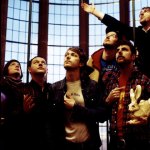The Nightingales spent the 80s being fêted by John Peel and straining the powers of the NME superlative generator. They are probably the only band to have supported both Nico and Bo Diddley on tour and they happily held their own against ‘top comedian’ Ted Chippington and punky all-girl band We’ve Got a Fuzzbox and We’re Gonna Use It on the era-defining Vindaloo Records Summer Special EP (if you missed it you might be surprised to learn that 1986 WAS an era). Singer and lyricist Robert Lloyd reformed the group in 2004 and they have since released three albums. Their latest, ‘Add Insult to Injury’, was produced by Hans Joachim Irmler from krautrockers Faust. For more information, visit their MySpace or their website for the latest on tour dates and other news. Robert Lloyd guides us through his filmic influences below. NICK DUTFIELD
1- Aguirre, Wrath of God (1972)
Herzog is considered an art-house director but in my opinion his eye for a story is second to none – including any of the celebrated populists. This story is simple, but mad. Aguirre leads a collection of conquistadors down the Amazon in search of El Dorado. His troops rebel, and, ravaged by power, he loses his mind and goes apeshit. The story unfolds beautifully, the filming is stunning, the soundtrack by German cosmic sorts Popol Vuh is just about perfect and the acting… well, Klaus Kinski in the lead role is one of the greatest performances I’ve ever seen. Herzog’s legendary best buddy and worst enemy drove the director to remark, ‘Every grey hair I have on my head I call Kinski’. Check out the Herzog documentary about their relationship and collaborations, My Best Fiend.
2- Beneath the Valley of the Ultravixens (1979)
This is such a hilarious, larger-than-life look at Smalltown USA that it can be called a live-action cartoon, a grade A lampoon. Trying to describe the plot is pointless because its stories of assorted small-town dwellers are basically a collection of lust-based gags and/or platforms for glorious, self-indulgent Russ Meyer-isms. Beyond his own jokey rantings, some blinkered bullshit from his hardcore fans and some down-looking sneers from some snobby cineastes, make no mistake – Meyer is a class act, and Ultravixens is the ultimate Meyer movie for me.
3- El (1953)
Luis Buñuel is mostly celebrated for his early surrealist films or his later, relatively glossy, successes made in France. But the bulk of his work was filmed in Mexico during the 50s and early 60s, and for me this is when he made his best films, including my favourite, El. A super-witty satire on obsession, jealousy and machismo, El tells the story of Don Francisco, played with fantastic relish by Arturo de Córdova, falling in love and descending into self-inflicted madness. There is humour aplenty and many scathing snubs on orthodoxy but the tale is presented in a fairly cheesy 50s melodrama style. I prefer this simplicity to the director trying too much ‘I’m wacky me’-type clever dickery. And the zig zag scenes – you gotta see it to get it – are among my top film moments ever.
4- Happiness (1998)
I was asked to pick only 10 movies so unfortunately Marleen Gorris’s A Question of Silence (1982) – my favourite separatist feminist comedy – has to make way for my top paedophile comedy, Todd Solondz’s Happiness. Joking apart, paedophilia is only a single element of this family story. True to life, all the characters in Solondz’s dark, middle-class satire are in some way fucked up, and most are adept at fucking up others. There is no beginning, middle or end but no worries because the story gets through anyway. Occasionally, the script tries a tad too hard to be smart, but there is enough spunk, provocative ideas and laughs for the movie to work.
5- In a Year with 13 Moons (1978)
Rainer Werner Fassbinder is my number one. In ways that I don’t have time to explain he has influenced and inspired my writing more than any poet, lyricist or rock star. His artistic fertility is both amazing and affecting. My pick of his movies would probably change every other day but of the 32 creations he made in the 70s this is one of his greatest. Following the success of his first English-language film, Despair, Fassbinder seemed bound for international recognition, but his lover committed suicide and, deeply depressed, he retreated from filmmaking. He returned with this astonshing but not exactly commercial movie. 13 Moons follows Elvira – superbly played by occasional Fassbinder bit player Volker Spengler in his first starring role – as she tries to face questions of love and identity. It is a brutal but moving, funny but tragic, in-your-face melodrama, which only Fassbinder would be brave enough to attempt, let alone carry off.
6- Kung Fu Hustle (2004)
This movie is absolutely brilliant entertainment. Vaguely based around a rather tacky love story, it tells a very Hong Kong-style tale of baddies trying to fuck over some decent sorts, to which the goodies respond, etc. But the story is immaterial. The action, which rarely stops, is the backbone and bulk of the film and the action is astoundingly good. It is genuinely original, wild, often hilarious and fantastically choreographed and filmed. As a big fan of martial arts movies, from the raw to the graceful, I must say this is, for me, the top of the lot. Stephen Chow’s Kung Fu Hustle is a must-see… again and again.
7- M (1931)
Just about my favourite actor is Peter Lorre and M is his first major role. He’s a motive-free, meaningless child killer in this paranoid film by the godfather of German expressionism, Fritz Lang. Often filmed from above, it feels like we are looking down on the grim, doom-laden chaos as cops and criminals – pissed by the new level of police presence on the streets – plot the capture of Lorre. Following a superbly structured chase and capture, we get one of cinema’s finest trial scenes. In the early part of the build-up, I like the way so much of the action is off-screen, leaving detail, but not event, to our imagination. Brilliantly lit and with imaginative sound ideas (the ‘Peter And The Wolf’-esque whistling refrain to notify coming menace has since become a mainstream ploy), this diligent but adventurous film set the standard for future screen psychopaths and tells us much about hysteria and mob mentality.
8- Occasional Work of a Female Slave (1973)
Without doubt my favourite abortion comedy. Alexander Kluge is one of the more intellectual types of New German Cinema. Perhaps because his work is the result of concepts and political theories rather than instinctive filmmaking he is one of the more overlooked directors from the late 60s new wave of German directors. However, his films – Occasional Work in particular – are terrific and far more satisfying than, for example, the more celebrated, American-ised, often wishy-washy, fare that Wim Wenders knocks out. Even though it is a bit shabby around the edges, Occasional Work is a mini-masterpiece. The story revolves around Roswitha – played by Kluge’s sister Alexandra – a housewife, mother and part-time abortionist whose repressive circumstances lead her to take singular action against… well, just about everyone. Roswitha’s hopeless verve and her trials and tribulations are unsentimentally portrayed with no small amount of wit. This is a rarely shown movie, and it is many years since I last saw it, but it still remains strong in the memory.
9- Strangers on a Train (1951)
I don’t know if this is Hitchcock’s finest film – the rarely seen Rich and Strange is a belter, and film buffs would list any number of other contenders – but it is a really cracking movie. The story, adapted from a Patricia Highsmith novel, is classic in its simplicity. Two men meet on a train – Guy, a sane, famous-ish tennis player looking for divorce from his unwilling wife, jokes that he wishes his spouse was dead. Bruno, a friendly psychopath, feels the same about his hated father and suggests they murder each other’s problems. Guy imagines this suggestion is a joke until Bruno carries out his half of the deal. When, in Bruno’s eyes, Guy bottles his half of the ‘contract’, Bruno tries to frame Guy for the murder of his wife. Bruno’s effort, Guy’s awkward denial and the ensuing turmoil lead to a giddy climax. Fantastic performances, several brilliant, memorable individual scenes and Hitchcock’s visual panache and sense of fun make this creepy, amoral and very funny movie a gem.
10- The Hairdresser’s Husband (1990)
When push comes to shove, Patrice Leconte’s Hairdresser’s Husband is the one I’d put forward as my all-time favourite film. The titular character, Antoine, played to perfection by Jean Rochefort, follows his boyhood fixation with a female hairdresser, who commits suicide, by, much later, fulfilling his ambition of marrying a hairdresser when he meets the beautiful Mathilde. The pair are gloriously in love and lead the happiest of lives together. The basic story is simple, sexy and for the most part joyous and delightful. Antoine’s dancing to his other love (Middle Eastern music), the couple getting shit-faced on hair tonics, their constant adoring looks at each other, the homemade swimming trunks… so much enchanting stuff captured with real brio by Leconte – an underrated director whose every film is a genre-hopper. This movie is a real beaut. Once you’ve seen it and fallen in love with it, try the same director’s Ridicule, then work your way through his others.










